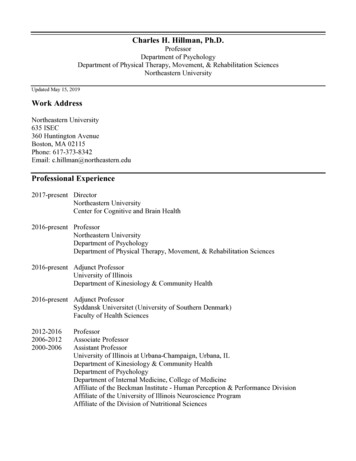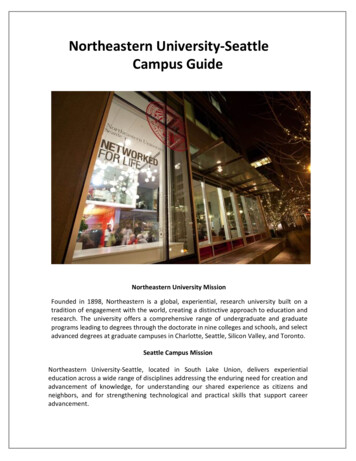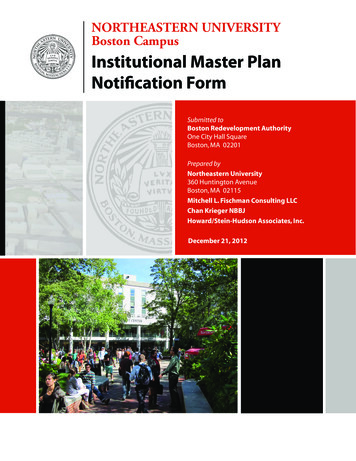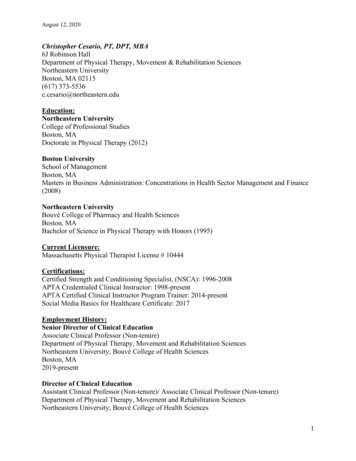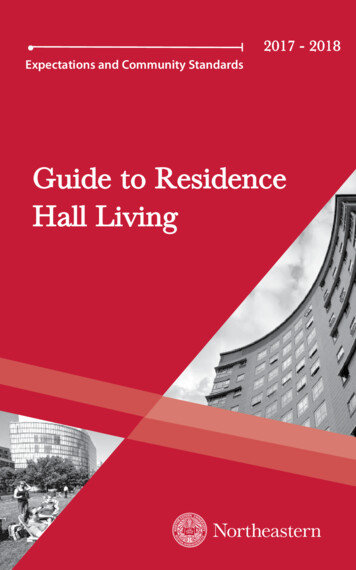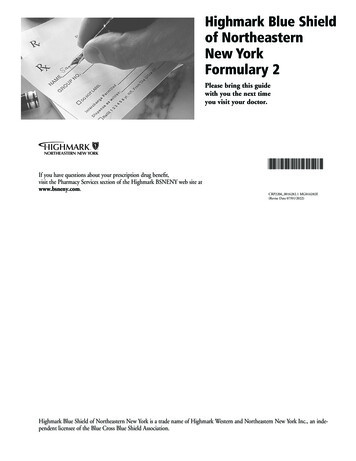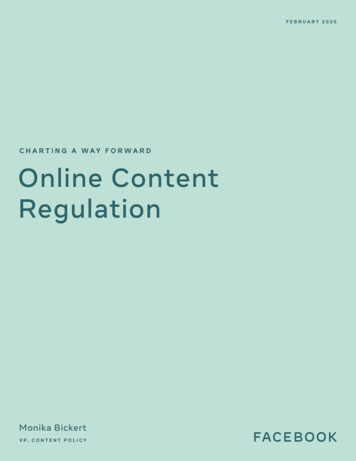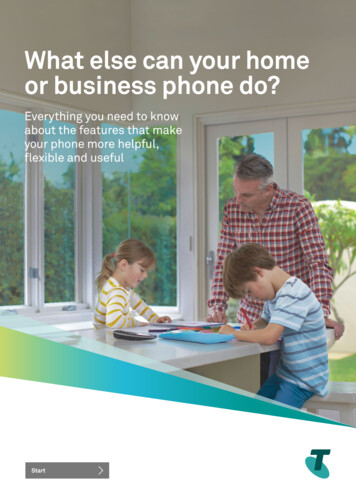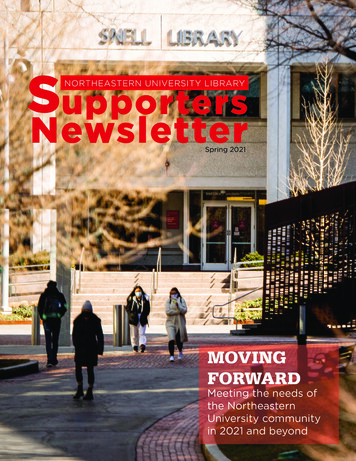
Transcription
Spring 2021MOVINGFORWARDMeeting the needs ofthe NortheasternUniversity communityin 2021 and beyond
A Note FromDean Dan CohenLast year in this newsletter, I wroteto tell you about the rapid changes thatthe Northeastern University Library wasmaking to continue to provide extensiveresources and services to our community,despite an incredibly challenging andgrowing pandemic. A year later, I amproud to report that due to the hardwork of the library’s staff, and thesupport of those who are reading this, wehave not just made it through this yearof COVID, but have, like our students,learned entirely new things that will stickwith us into the future.While we look forward to returningfully to Snell Library to meet with Huskiesin person, we have also developed new ways of helping scholars wheneverand wherever they might be, across the globe. For students who could notget to campus this year, or who were studying from their dorm or housing inBoston, this was an enormously useful advance. We have also added greatnew digital collections that are accessible from our expanding list of globaland regional campuses, and we are excited about welcoming new studyspaces being added to those campuses.The critical work of the library’s archives in gathering the communalhistory of Boston became even more important over the past year, as ourcommunity reckoned with the inequalities that persist in our culture—andour cultural record. New community collections will enrich our mutualunderstanding and highlight stories that for too long have been overlooked.In these pages you will find reflections of some of those stories and thegenerous support that has enabled all of this work to happen. As we emergetogether after a difficult year, I hope you’ll join me in celebrating the successof the Northeastern University Library.Katz Gift Provides Unique Glimpseat Recording IndustryFormer reporter and editor at the BostonHerald, Larry Katz, who for decades interviewedsome of the biggest names in pop music, hasdonated the tapes of his original interviews tothe Northeastern University Archives and SpecialCollections, a collection of over 800 interviewson 400 tapes and 500 transcriptions. To learn more about Larry’sbehind-the-scenes interviews with Dizzy Gillespie, Prince, and othermusical legends, listen to Interviewing Popstars, a What’s New Produced by Communications and Advancement OfficesNortheastern University Library, Spring 2021library.northeastern.edu 617-373-5001Designed by Kerri Vautour, Events & Marketing CoordinatorCover photo by Matthew Modoono/Northeastern UniversityMeet the NewLibrary StaffSteph Barnaby, Evening/Weekend Librarian(she/her). Steph is a Northeastern alumna (CSSH’12)who received her Master of Library and InformationScience degree from San Jose State. She is an activemember of the Intellectual Freedom Roundtable of theAmerican Library Association and previously oversawevening operations at Boston University’s Fineman &Pappas Law Libraries.Jodi Bolognese, Engineering Librarian (she/her).Jodi is the liaison to the College of Engineering andPhysics, working with students and faculty on theiradvanced learning and research projects. Previously,she developed online curriculum and problemsolving practice and tutorial software for Science andEngineering at Pearson Education.Philip Espinola Coombs, Health Sciences Librarian(he/him). Philip serves as the liaison to a number ofprograms in the Bouvé College of Health Sciences.He also has a background supporting systematicreviews and he previously worked as an Educationand Information Services Librarian at the BostonUniversity Medical Campus.Candace Hazlett, Digital Scholarship Developer.Candace works with the Digital Scholarship Groupto create Ruby-based websites to publish intricatedata for public history and broader Digital Humanitiesprojects. She previously developed software forhealthcare tech companies.Kate Kryder, Research Data Analyst (she/her). Kateis a data visualization specialist who graduated fromNortheastern’s information and design visualizationprogram. She has tackled data in a variety of fields,including environmental consulting, construction,finance, and most recently, the MBTA.Luesoni Kuck, STEM Librarian (she/her). Luesoniserves as the liaison librarian to a number ofdepartments in the STEM field, putting both herMaster’s degrees in Biology and in Library andInformation Science to good use. While earning herMS/LIS at Illinois, she worked in their mathematics,engineering, and virtual medical libraries.Meg McMahon, Northeastern CommonsCoordinator (she/they). Meg is focused on shapingthe Northeastern Commons, a new collaborativeonline community. They have a background in webmanagement, art, and makerspaces, and recentlygraduated from the University of North CarolinaSchool of Library and Information Science.Bill Quinn, Semantic Data Specialist. Bill is aNortheastern alum who defended his dissertation inthe English Department in 2019. He works with XMLencoded text documents for the Digital ScholarshipGroup and the Massachusetts Historical Society.Amy Ruskin, Data Engineer (she/her). Amy augmentsdata structure from research and teaching projectsto make them more searchable and discoverable. Sherecently earned her Master’s degree in InformationStudies from McGill University and previously workedas an analyst in the insurance industry.
Online reference at a glance1,400386131Questions submitted tothe library via emailOnline classes featuringa lesson or embeddedmodule from a librarianOnline workshops andwebinars hosted1,10036332Questions submitted tothe library via chatRemote consultationsperformed by librariansNew online tutorialscreatedStats from July 2020 - February 2021Librarians Adapt toOnline TeachingBy ALISSA LINKHead, STEM&EResearch and instruction librarians hadto adapt significantly to the pandemic andimmediately pivot to online delivery of all ourclasses, workshops and appointments withstudents and researchers. Many librarians werealready familiar with and providing consultingservices and webinars online, but even with someexperience under our belts, there were a lot ofsoftware, tools, and best practices to learn ina short period of time, including Zoom, Teams,Canvas, and Adobe Creative Suite.Some teaching was done throughvideoconferencing, in which librarians “visited”classes by appearing live in Zoom and workingwith students synchronously or in a liveenvironment. Some teaching was done by creatingvideo and slide tutorials that students could workthrough on their own time, a model that is calledasynchronous learning. Finally, some classes, likethe First Year Engineering program, were flippedto include a combination of synchronous andasynchronous, where librarians met with students,and students also did an online componentthemselves (see page 7). Some classes wereeasier to translate for an online classroom thanothers, but in all cases both content and methodof delivery needed to be rethought and redesignedfrom the ground up.Online Learning Librarians Reach Outto London CampusThe Online Learning teampartnered with subject librariansin the arts, humanities, and socialsciences to co-teach nine orientationsessions for the NCH London campusin the first two weeks of November.These sessions provided introductionsto library resources and services forthe Philosophy, History, Art History,English, Creative Writing, Politics,Economics, Law and Apprenticeshipprograms. Both faculty and studentsjoined these live Zoom sessions andprovided positive feedback aboutthe library’s resources and services.Several students also scheduled followup research appointments with theirsubject librarian as a result of thesevirtual introductions.A Library Global StudentAdvisory Board was created this year,with 16 students applying to join froma variety of campus sites and onlineprograms. The group has virtually mettwice to provide feedback on libraryservices, resources, and the best waysto communicate with a global studentpopulation.
CRRJ Project Archives Helps BringReconciliation to Racially Motivated CrimesBy GINA NORTONSMITHProject ArchivistAs the broader American public hasrecently begun seeing the social, economic,and political impact of historical injusticesin the United States, one thing hasbecome clear—we don’t all have the sameunderstanding of the events that broughtus to this place. Too often, violence hasbeen used to enforce boundaries on wherepeople could live, work, and exercise theirright to vote. Bringing that history to lightand working toward justice for the victimsof violence and their communities isimperative to achieving true equality for all.The Civil Rights and RestorativeJustice Project (CRRJ) at the NortheasternUniversity School of Law does this work,conducting research and supporting policyinitiatives on anti-civil rights violence in theUnited States and other miscarriages ofjustice during the period of 1930-1970.CRRJ has come to serve as a resourcefor scholars, policymakers, and organizersinvolved in various initiatives seekingjustice for their crimes. Since its foundingin 2007, CRRJ has amassed thousandsof investigative records about racialviolence—death certificates, police reports,and Department of Justice and NAACPfiles, along with their own interviews andinvestigative reports.This historical information isavailable through the CRRJ BurnhamNobles Archive (BNA) and is organizedMurder in Mobile, a documentary about the 1948 murder of Rayfield Davis by a white man whoconfessed to the crime but was not prosecuted, earned a Boston/New England Regional Emmy. Thedetails of Davis’ case were uncovered by Chelsea Schmitz, a law student working for the CRRJ.into two main parts: a collection of theevidentiary records compiled by lawclinic investigators, and a database ofinformation captured from those records,both provided to users on a dedicatedwebsite.As you might imagine, such a largerproject requires the work of many. I washired as Project Archivist in February2020 to work as the bridge between thelegal staff of CRRJ and the staff in theNortheastern University Library. Being partof the Northeastern University Archives &Special Collections allows me to access theexpertise of colleagues with experiencewith other collections and digitalprocesses. Many other NU library staff aredirectly involved in bringing the project tolife, as well.To learn more about CRRJ and to viewthe Burnham-Nobles Archives, visit crrj.org.Discovering Roxbury: New donation shines lighton neighborhood’s history and current offeringsBy JILL CHANCELLORArchives Assistant,Archives and Special CollectionsOne of the newest neighborhoodcollections added to the NortheasternUniversity Archives and Special Collectioncomes from the non-profit organizationDiscovery Roxbury.As its name implies, Discover Roxburyaims to help people, both locals and tourists,to discover all of the things Roxbury hasto offer. Originally named the BridgesProgram, this organization was started byMarcia Butman in 1995 in order to introduceurban neighborhoods to suburban parentsand students in the METCO program.The organization offers foot, trolley, andbike tours that include visits to historicsites, art galleries, and restaurants. Thesethemed tours are lead led by trainedRoxbury residents passionate about sharingtheir knowledge on the history of theneighborhood and its current vibrant artsand culture scene.Butman’s vision for the organization hasalways been collaboration, which has led topartnerships with organizations such as theRoxbury Cultural Network, The First Churchin Roxbury, Roxbury Heritage State Park,and the Greater Boston Convention andVisitors Bureau. Through these partnershipsDiscover Roxbury has been able to holdevents supporting local artists such asRoxbury Open Studios and ArtRox, eventssupporting local restaurants and cuisineslike Roxtoberfest, as well as holiday pop upsand their annual fundraiser Heart of the Hubheld at the historic Hibernian Hall located inDudley Square.The collection includes marketingmaterials for events and programs,administrative materials, and research usedfor teaching resources and tour scripts.The collection is currently unprocessed,but if researchers are interested in usingthe materials, please contact archive staffat archives@northeastern.edu. If you areinterested in supporting processing anddigitization efforts for this importantcollection, please send your gift in theenclosed envelope.
Teaching with the Archives Moves OnlineThe idea of attending a class basedon archival materials virtually, without theability to directly handle the materialswhile exploring them, would be impossible.But Reference and Outreach ArchivistMolly Brown and her students learned thatlearning about the archives via Zoom hasits benefits.Starting in the spring of 2020, Mollymoved all Teaching with Archives programinstruction online, beginning with Historiasde Boston, a youth program organized bythe National Parks Service of Boston whereyoung people gathered to learn how to tella story about Boston’s history informedby archival material from communityorganizations and activists.In an in-person version of this session,students would navigate boxes of archivaldocuments independentlyand depending on thebox they explored, comeaway with very differentinformation than theirfellow learners. In aremote session, everyoneviewed and discussed thesame document with ease,without having to huddlearound a folder, and as agroup were able to createa shared understanding ofarchival storytelling.Other sessionsallowed students in theclass to view the materialdirectly from the archivesArchivist Molly Brown (top center) and Librarian Regina Pagani (topthrough a documentright) teach students in Professor K.J. Rawson’s English class “Openingcamera (left). Studentsthe Archive” via Zoom.had the chance toDigital Repository Service. Using theseremotely experience whatrecords, Molly created remote classes forin-person archival research can look like,and all got to share the surprise and delight many departments including: Architecture,Music, English, History, and Journalism.of opening an archival folder with unknownThe remote classes taught students howcontents as a class.to perform archival research remotely, tellRemote sessions not only alloweda rich story using archival records, and useparticipants to view and discuss the samecommunity informed archives to supportarchival material, but it also allowed fortheir research and project development.different ways to absorb it. While reviewingIn the next year the class sessionarchival documents, students could listenmaterialswill be available as a part ofto them be read aloud, view a copy onthe Teaching with Archives programtheir own, or view the copy shared in theclass call. Students were also able to record for students, teachers, and communitymembers alike to take and use forreactions and questions in the chat withoutthemselves. Check the Teaching withinterrupting anyone speaking whichallowed for multiple modes of participation. Archives program page for ost classes drew from the 000 digitized records from the archives,stored in Northeastern University Library’sAs the Archives and Special Collections strivesto make The Boston Phoenix more accessible toresearchers interested in Boston’s social, political, andcultural history, they teamed up with Zooniverse, acrowdsourcing platform that connects researcherswith volunteers to help accomplish major projects.Thanks to this collaboration, The Phoenix indicesfor 1973-2000 now have been digitized and will beextremely useful in helping researchers locate theinformation they need. We continue toward our goal ofdigitizing and linking the entire collection to the indexand ask for your philanthropic support. Visit phoenix.library.northeastern.edu for complete contents ofThe Phoenix collection.
New guides share anti-racism resourcesIn the wake of the murder of George Floyd and the proteststhat erupted throughout the country, the library developedan anti-racism guide to connect students, staff, faculty, andcommunity members to resources related to anti-racism work thatare available through the library and Northeastern University.First Year Experience and Undergraduate EngagementLibrarian Evie Cordell; Engineering Librarian Jodi Bolognese;Reference & Outreach Archivist Molly Brown; and LibraryInstruction Specialist Christine Oka collaborated to develop theAnti-Racism Guide, with assistance from other library staff whovolunteered their opinions via survey and focus group.The subsequent guide organizes resources into sections:zzzzzzzzFind Resources serves as an introduction to a varietyof Northeastern Library resources including books,databases, and various types of media.Find Resources by College allows people to discoverresources in one’s chosen college and field.Support at Northeastern allows people to broaden theirdiscovery to the larger Northeastern community andincludes a variety of clubs and organizations.Take Action invites users to get involved on a broaderscale.Since its creation, the Anti-Racism guide has been showcasedon multiple university platforms. It is included on several collegehomepages and has been used in workshops and classes acrossthe university.Focusing on STEMBlack, Hispanic, and female workerscontinue to remain underrepresentedin the growing STEM workforce. Headof STEM & Entrepreneurship Alissa Linkcreated a new resource page to expandon the tools, resources and materialsavailable to STEM students, faculty, andstaff.Using the same framework asthe Anti-Racism guide (above),Alissa, together with Jodi Bolognese(Engineering Librarian) and LuesoniKuck (STEM Librarian), compiled STEMspecific resources which includes acomprehensive list of articles, webresources, books, podcasts, and oncampus student organizations dedicatedto supporting students of all racial,gender, and social identities. In addition,a supplementary reference list wascompiled to highlight the numerousoff-campus professional organizationssupporting diversity in STEM.Upon publication of the Anti-Racismand Diversity in STEM page, severallibrarians decided to adapt the pageto individual disciplines. Some of thenew pages that were developed includeAnti-Racism and Diversity in Engineering,Health Sciences, Physics, Chemistry,Marine Science, Environmental Science,Bioinformatics, Biotechnology, and HealthInformatics.Library Strengthens Anti-Racismand Diversity MissionIn addition to making anti-racism resources more easily available to theNortheastern University community, library staff also worked to strengthen its statedmission with regard to diversity, equity, and inclusion.In the fall of 2020, library adminstrators and staff collaborated to create aStatement on Diversity, Equity, and Inclusion, with the goal of making the library’scommitment to these important issues clear and direct.“The Northeastern University Library actively pursues asociety free of racism and universally committed to diversity,equity, and inclusion.Vocal support for social justice is essential but notenough. Commitment to these central values must comein the form of consistent, concrete actions in our daily workas individuals and through large-scale initiatives acrossthe organization in order to improve our library and thecommunities it serves, within and beyond the university.”For the library’s full Statement on Diversity, Equity, and Inclusion, includingspecific action items, visit uityand-inclusion
Studios Services Without the Studios SpaceBy DEBRA MANDELDirector, Recording StudiosWhile the Recording Studios has not been open to visitorssince March 2020, Studios staff have worked hard to provide theirservices and resources to the Northeastern University students,faculty and staff, while they attempted to turn their homes intohome studios.CROWNING ACHIEVEMENTSFormal class instruction: Jon Reed taught podcastingand audio production skills to 20 class sections in English,Architecture, Law, Bouvé, Business, and Music.“Jon and I worked on a podcast project for my first yearwriting class and, in certain ways, being remote actually enhancedour interaction,” said faculty member Lynn Dornink. “I was stillgetting used to using Zoom for class so I wanted to make surewe had an ‘air tight’ agenda.There was also a cool meta elementbecause we were using the very technology (Zoom) the studentswould be using to record their group podcast. In the end, thepresentations were some of the best I’ve ever had. Even moresurprisingly, I did not receive one panicked email asking abouthow to upload sound files!”New online workshops: Studios’ staff, Jonathan Iannone,Antonio Banrey, and Reed and co-ops Chris DiPierro and Barrettcreated practical webinars on remote services; podcasting; settingup a home studio; and audio and video post-production. You canwatch these on the Digital Media Toolkit. These webinars received1,153 views.Equipment lending program: Following proper protocols,staff set up a simple pick-up and return process for lendingmicrophones and cameras to support a range of media projects.Original Music Production: The musically talented Studiosfull-time, co-op, and part-time staff (The Snell Family Band)created an original song called “Protect the Pack” about theCovid-19 experience. This project demonstrated the collaborativepossibilities for recording and mixing remotely.Launching of New [I’m] Possible Podcast Series: Banreyco-produced this new series as “a space dedicated to holdingconversations surrounding identity in the workplace and how tobuild a resilient future fueled by individual passion and purpose.”The podcast is available on Spotify.Collaborations with the Boston Research Center: Staffassisted with the post-production editing of oral history interviewsconducted on Zoom during the pandemic.To browse the Recording Studios’ Showcase, visitrecordingstudios.library.northeastern.edu.To access the Digital Media Toolkit, visit subjectguides.lib.neu.edu/mediakit.FYE Program Enhanced with New Engineering LibrarianIn recent years, the library’s Research & Instruction team has partneredwith the First Year Engineering (FYE) program to create a series ofworkshops designed to introduce new engineering stuents to key researchresources and skills. In that time, the program has grown exponentially,serving more than 500 first-year engineering students in fall 2019.The program received a bigger boost by the hire of EngineeringLibrarianJodi Bolognese, who arrived just in time to join First Yearand Undergraduate Experience LibrarianEvie Cordell, Head of STEM &EntrepreneurshipAlissa Link, and Computer Science Librarian BrookeWilliams as they attempted to adjust the program in the wake of theCOVID-19 pandemic in the summer of 2020.The group developed a two-part workshop consisting of both recordedtutorials that students view on their own time and live workshops held viaZoom.Despite the adjusted teaching strategies, the outcomes were positive,with librarians reaching 644 students in 38 workshops. Students reportedboth the in-person and recorded lessons were useful, an opinion that wassupported by their academic performance. When compared with resultsfrom the previous year, end-of-semester surveys of both faculty andstudents found no significant drop off in the quality of the workshop frommoving to online from on ground, indicating a successful transition andleading to some new instructional strategies that the team will consider asthey plan for continued improvements in the upcoming 2021-22 academicyear.
Snell Library Celebrates 30 Year AnniversaryOn December 10, alumni, parents, andfriends gathered for a virtual celebrationto commemorate the past three decadesof Snell Library’s accomplishments. Asymbol of Northeastern’s growth andtransformation, Snell Library opened in1990. It’s hard to imagine that what wasonce a parking lot is today the heart andhub of the Boston campus.In 1988, Northeastern beganconstruction of what would be its largestbuilding at the time under the direction ofPresident Kenneth Ryder, former SeniorVice President of Development GeneReppucci, E’60, MEd’65, H’95, and TrusteeEmeritus Harvey Krentzman, E’49, H’91.Opening two years later, SnellLibrary added close to 150,000 squarefeet for research use, study space, andcommunity events on campus. Thesuccessful construction of the buildingwas accomplished primarily through theCampus Campaign, which generatedexcitement and support from severalsources, notably George, E’41, and LorraineSnell, for whom the library is named,and from within our own community,with participation from almost 1,000Northeastern University employees.Following a message from PresidentJoseph Aoun, Dean of the LibraryDan Cohen led a presentation, sharingphotos of Snell through the years, whilethanking esteemed guests in attendanceand remembering special supporters.Cohen also shared a glimpse into futurerenovation plans which have just begun atthe library and provided insight into thelibrary of the future.Evan Simpson, Associate Dean ofResearch and Learning Services, deliveredan update on current services and offeringsto the Northeastern community. Reppucciand his wife Corinne, LA’64, MEd’71, sharedtheir thoughts about the importance of thelibrary, how much it means to them, andwhy they have made the library a priority intheir philanthropic plans.Attendees shared personal stories andmemories, as well as treasured mementosand photos. Alumni parents donated athoughtful gift to name and renovate aCo-Lab and several other donations weremade in honor of the celebration.The event concluded with Cohenleading a toast to the past, present, andfuture of the library, and again expressedappreciation to our many supporters.Here’s to the next 30 years!To view the recorded celebration, visityoutu.be/ctv 2AUtyiU.The future of the libraryLibrary planning continues to move forward with the design phase ofour upcoming top-to-bottom renovation plans well underway. On-goingreview of architectural renderings, space assessments, and design reviews areproceeding on schedule. Despite construction restrictions during the pandemic,we successfully completed adding new restrooms, updated others, and havefinished several other facilities projects throughout the building.We look forward to providing updates as we move from the design phaseto the construction process and are excited about providing new unique andexciting spaces for research and learning for our community.We have a limited supply of 30th Anniversarycommemorative glasses available for oursupporters. Please contact Gail Mansfield atg.mansfield@northeastern.edu or (617) 373-5452to request.
WWP Shines Light on Early Women’s WritingBy JULIA FLANDERSDirector, Digital Scholarship Groupand SARAH CONNELLAssistant Director, Women Writers ProjectOne of the oldest digital projects in thehumanities, the Women Writers Project isfinding new ways to make early women’swriting visible and accessible. Founded atBrown University in 1988, the WWP cameto Northeastern in 2013 as part of theLibrary’s newly formed Digital ScholarshipGroup. The WWP’s core publication isWomen Writers Online, an internationallyfamous collection of nearly 430 texts bywomen from the pre-Victorian period.The project brings together a group ofundergraduate and graduate students whowork intensively to research and digitizewomen’s texts. This fall Grace O’Mara,who received a Northeastern PEAK awardin the fall 2020 semester, worked withJacob Murel, a PhD candidate in English,on encoding two early women’s almanacsthat include medical, astronomical, anddomestic information.As this collection grows, it becomes afascinating and important source of dataabout women’s writing, and the WWP isbuilding a digital “lab” space with tools fordigital analysis. This summer, the WWPwill continue a series of public workshopson machine learning and text analysis,focused on the Women Writers VectorToolkit. The series was interrupted by thepandemic but will continue in virtual formthis summer and (we hope) face to face insummer 2022. The Toolkit offers a webbased space for exploring how words andmeanings are associated within the WWPcollection, and also allows comparison withother collections from later periods (suchas the Victorian Women Writers Project) orA visualization of the percentage of femaleand male speakers in each scene of MargaretCavendish’s The Convent of Pleasure (1668).by male authors (drawing from the massiveEarly English Books Online).Supporting this collection of primarysources, the WWP is also gatheringmaterial that situates these texts withintheir time and place. A collection ofperiodical reviews (published under openaccess as Women Writers in Review)shows how women’s texts were receivedby the public, often in ways that anticipatemodern feminist perspectives. Forexample, a review of Lucy Aiken’s 1810Epistles on Women calls attention to theimportance of this work as being writtenboth by a woman and about women, andobserves that the reviewer is “happy to seea woman asserting the proper dignity ofher sex, and evincing by her own examplethat female pretentions are well founded.”To help readers connect with thewealth of topics and perspectives inwomen’s texts, the WWP also publishesa series called Women Writers inContext that features essays writtenby top scholars on their fields. Theseessays provide important contexts forthe texts in WWO and show how earlywomen writers engaged with historical,social, cultural, religious, and politicalconcerns. The WWP recently launched anew series in celebration of the project’s30th anniversary in 2018: “Thirty Years,Thirty Ideas” has essays on race, animals,witchcraft, aging, and other key topics thathelp illuminate the many ways that womencommented on and contributed to the
Northeastern University Library, Spring 2021 library.northeastern.edu 617-373-5001. Designed by Kerri Vautour, Events & Marketing Coordinator Cover photo by Matthew Modoono/Northeastern University. Former reporter and editor at the . Boston Herald, Larry Katz, who for decades interviewed some of the biggest names in pop music, has
